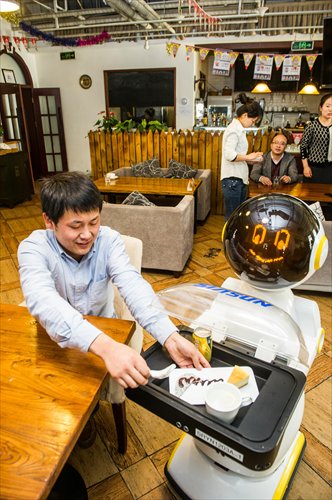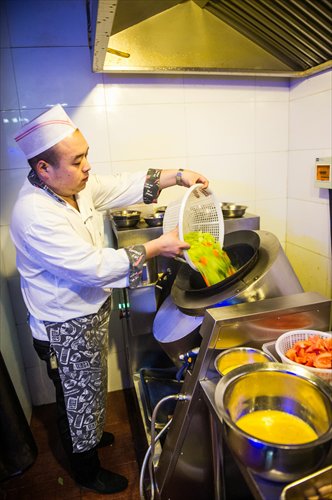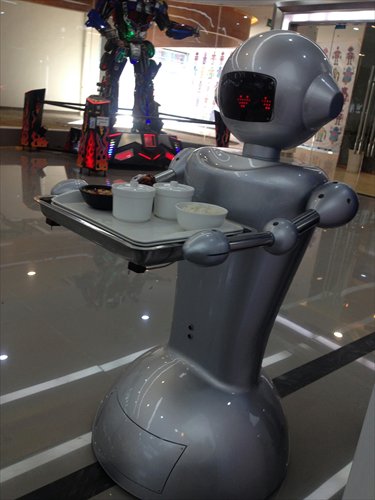Robot restaurants
Will mechanical chefs and waiters eventually replace their human counterparts?

A robot waiter named Xiaoxuanxuan currently on trial use at The House Cafe in Haidian district. Photo: Li Hao/GT
Several weeks ago, when Zhou Yugang sat down at his regular cafe near Tsinghua University in Beijing's Haidian district, he was met with an unexpected surprise. After making his order as usual, his coffee was brought to him by a robot.
"I took the coffee from a tray between the robot's hands, pressed a button [on the robot] as I was told to by a [human] waiter, and then the robot nimbly turned around and left," said Zhou, bemused.
"It performs all the functions of a waiter, from delivering the food to customers to greeting guests at the door," said Xuan Zhong, one of the proprietors of The House Cafe and the inventor of the robot. "It is preprogrammed with around 100 basic sentences to communicate with people, and it also utilizes cloud technology to answer people's questions. If it's running low on power, it knows to return to the charging station to charge itself of its own accord."
Xuan, who graduated from Tsinghua with a degree in mechanical engineering, first concocted the idea of designing his own robot waiter in 2012, as a ploy to attract and amuse customers. After more than a year of research and development, the cafe's newest staff member was put to use in October, and is still on its trial period, according to Xuan. "Since the robot was put into use, the sales volume of the cafe has increased by around 50 percent."

Zhai Kuan, the "recipe designer" for the semi-automated "robot chefs" at Wilwi Robot Restaurant, puts some ingredients into the machine. Photo: Li Hao/GT
Robot waiters
Xuan's cafe is not the only dining establishment in China to utilize semi-automated servers. In recent months, articles have appeared in the Chinese news media reporting the novel appearance of "robot restaurants" around the country, boasting not only "robot waiters," but also "robot chefs."
The largest of these restaurants, according to a Xinhua report in August, is an establishment called Tianwaike Robot Restaurant in Kunshan, Jiangsu Province, in which robots are almost entirely responsible for the production and serving of food to customers. The same report noted that besides novelty value, owners of such restaurants were motivated by the fact that using robots could help to streamline the production process, ensure the consistency of the food, and cut costs of operation. While a robot waiter could cost anywhere between 40,000 yuan ($6,425) and 300,000 yuan, the report noted, owners didn't have to pay wages, and there would be no limit on the number of hours a robot could work per day.
Diners' reactions to the restaurants, however, have been mixed. Lily Li, a 36-year-old civil servant who recently visited a robot restaurant in Anhui Province called Mr. Robot that is still in its soft launch, said she was unimpressed with the robot waiters that served her.
"They're just like machines on an assembly line, carrying and sending trays according to instructions that have been input by human staff members," said Li. "I thought they would be more interactive, [but they can't even answer] basic questions like 'where is the restroom?'"
However, Xuan said that his robot, which he had named Xiaoxuanxuan after a nickname for his son, had been well-received by his customers. Unlike most of robot waiters used by other restaurants, Xuan said, his robot is custom-designed, does not need magnetic tracks to move, and is more interactive.
"It can sense obstacles and if someone is in the way, it will say, 'Excuse me, could you please make way for me?' If you ask him, 'What have you eaten today?' he will search from the cloud and choose the most widely-used answers to give you a reply," said Xuan.
He admitted it was unable to tell guests where the bathroom was or how much the bill cost.
Zhou said he still preferred being served by a human waiter or waitress. "I want to be able to have a real conversation with the person serving me."

A robot waiter serves up food at Mr. Robot in Wuhu, Anhui Province. Photo: Courtesy of Lily Li
Automated cooking
Wilwi Robot Restaurant in Beijing's Haidian district does not have any robot waiters, but it does have "robot chefs."
The "chefs" do not have any humanoid characteristics. Instead, it looks like any other piece of industrial machinery, with multiple funnels for ingredients and seasoning. Human staff members, with the job title of "technicians," put pre-chopped ingredients and seasoning into the machine, and then the machine does all of the cooking, based on recipes that are programmed into it.
Zhai Kuan, the "recipe designer" at Wilwi, said that they currently had two models: one which was semi-automated, for preparing large quantities of food, and one that was fully-automated, which could prepare individual dishes. "All the raw ingredients are prepared and packed into uniform packages in a central kitchen, and then they are sent to the restaurant," said Zhai, who previously worked as a chef at a Cantonese restaurant in Beijing. "For the fully-automated machine, you just put the seasoning in one funnel, and the ingredients in another, and it will give you a fully prepared dish in a matter of minutes."
Zhai said that hundreds of recipes could be programmed into the machine including classic dishes like Kung Pao chicken and Crystal River Shrimp, and that the machines ensured the consistency of cooking, as well as saving operational and staff costs.
Reception to the food produced by the robot chefs was again divided. Educational worker Liu Xi, 31, who frequents Wilwi regularly, said that the food was "delicious," an opinion shared by one of her colleagues, Wang Na.
However, customers of Mr. Robot, which uses similar machines, were more critical. Tricy Yang, a 34-year-old radio DJ in Wuhu, Anhui Province, who recently ate at the restaurant, said the food was underwhelming, especially for the price. She said that she ordered a set meal, consisting of beef, a steamed egg, a plate of vegetables, a pig trotter and a soup, which cost 98 yuan. "I think that restaurants should put flavor first," said Yang.
Zhao Xinyu, a television chef, was skeptical about the ability of automated machines to produce good-tasting food.
"Robot chefs might be alright for producing large quantities of fast food, such as lunches for workplaces, but for more personal settings, I don't think chefs can be replaced," he said. "With a set recipe, the taste of every dish is the same. There is not much space for creativity. Customers will be tired of tasting the same-flavored food."
Mou Zhenli, a respected food columnist, shared Zhao's opinion.
"I don't think that robot chefs can replace real chefs because cooking Chinese food is a process that requires a lot of creativity and emotional engagement," said Mou. "Real chefs are very flexible and can give full play to their creativity by constantly adjusting the cooking times, ingredients, and temperature of cooking. Often a chef will taste the dish half way through cooking, and then make adjustments. This can't be done by robots, who are pre-programmed to a set pattern."
Jiang Ping, CEO of Wilwi Catering Company which runs Wilwi Robot Restaurant, said the different customer reactions could be attributed to the design of the recipes - after all, the seasoning and ingredients are still determined by human chefs. "I guess that the recipes [at Mr. Robot] are not well-designed, so the food the machines produce doesn't taste very good," said Jiang.
Rise of the machines
Xuan said he did not expect robot waiters to completely replace human staff, primarily due to cost. He said to build a robot that can fully replace the functions of a waiter would cost far more than simply hiring a waiter.
However, Zeng Zhicheng, deputy general manager of Pansun Technology Company which produces the machines used by Wilwi, said that he expects "robot chefs" to revolutionize the food industry. Zeng said the machines they produced are already being used by fast food franchises such as Xingzhiwei fast food chain restaurant under Beijing Xiangeqing Corporation, as well as in certain schools and government offices.
Jiang agreed. "Such machines can help to promote the standardization of Chinese food, to make it the same everywhere, as well as saving costs for human labor," she said. "In the future, the role of chefs will be as technicians, researching and developing recipes, and it will be up to robots to cook it."
Other food industry professionals however, were not so sure.
Wu Simin, manager of Mr. Robot, said she was aware that some of her customers were unimpressed by service and the food at her restaurant. "I can understand why some customers have complained about the food not being very good, and the robots not being smart enough. Actually, using robots is just a gimmick."
Wu stressed however, that the restaurant was still in its soft launch period, and asked customers to be patient as they continue to make improvements.
Wang, a regular at Wilwi, said she had no qualms with the food. "Although almost every dish made by the robot chefs taste nearly the same, it gives us another option, and the food is always clean and delicious."